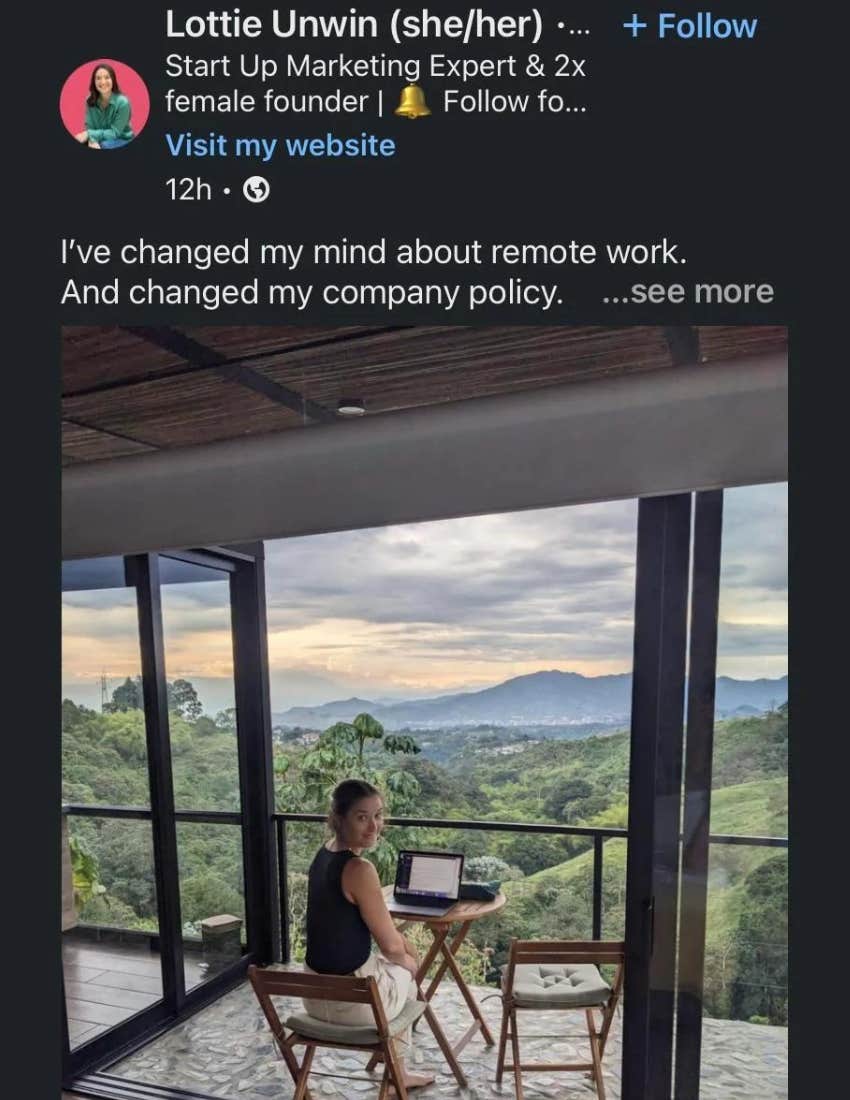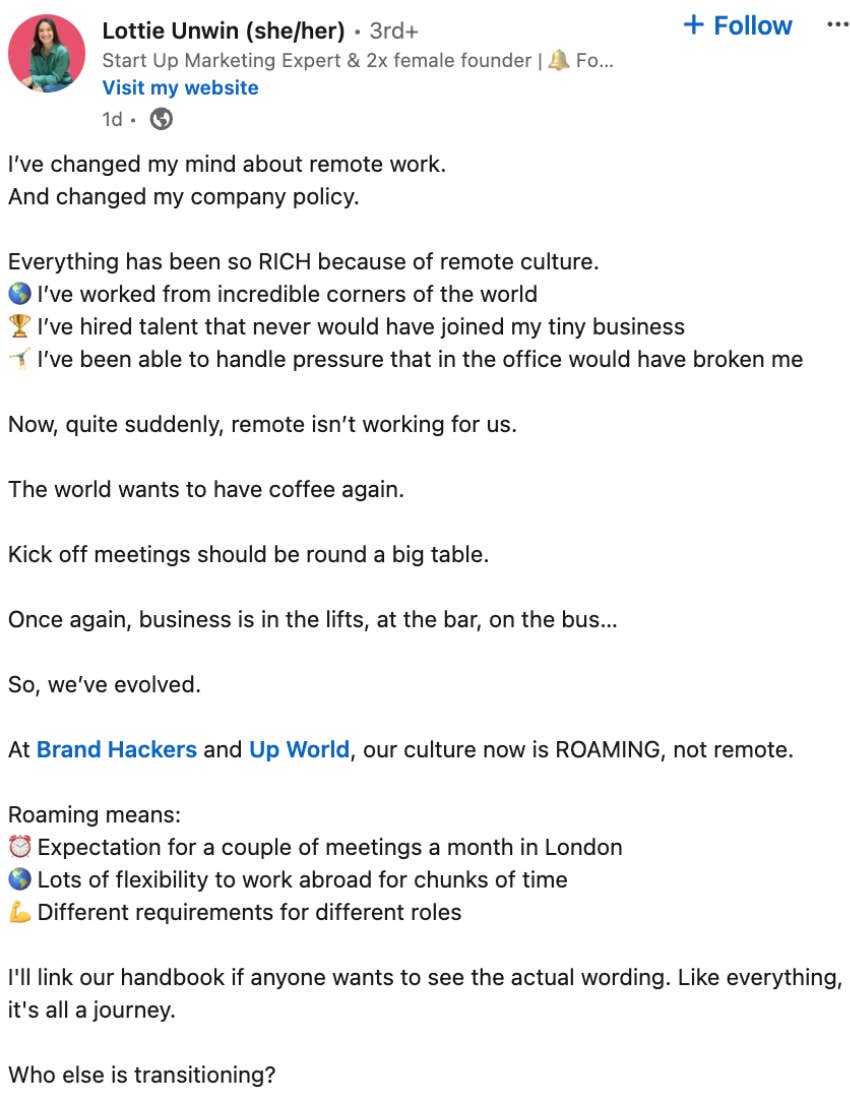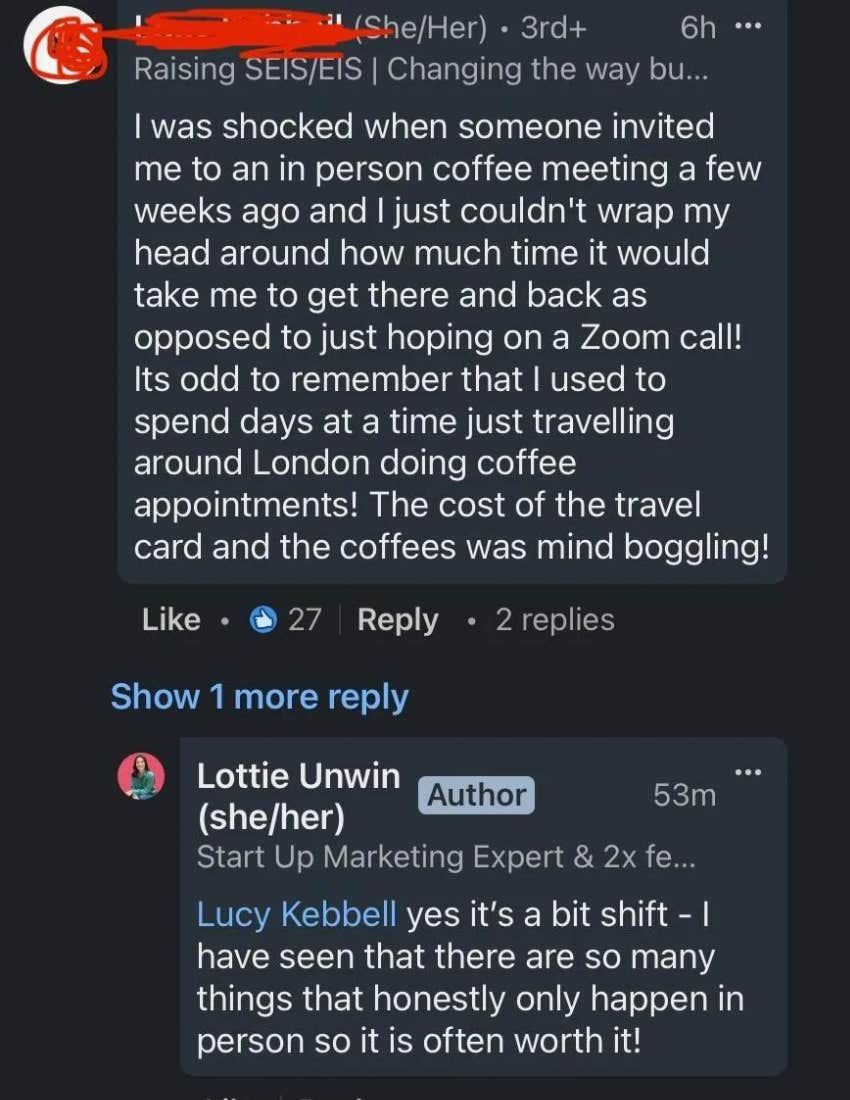CEO Says She Changed Her Mind About Remote Work, Even Though It Built Her Company—'Business Is In The Elevator, At The Bar, On The Bus'
"Suddenly, remote isn’t working for us. The world wants to have coffee again."
 fizkes / Getty Images Pro / Canva Pro
fizkes / Getty Images Pro / Canva Pro The way things are going, it's really starting to seem like remote jobs will once again soon be the outlier, as more and more companies issue return-to-office mandates.
Now it seems even those who built their businesses on remote work have jumped on the "remote work is bad" bandwagon, if at least one businesswoman is to be believed.
Start-up founder Lottie Unwin said she's 'changed her mind about remote work' even though it was the linchpin to her company's success.
Despite being wildly unpopular with workers, more and more companies are issuing return-to-office mandates. One survey by Resume Builder found that 90% of companies plan to issue and enforce a return-to-office mandate by the end of 2024.
 Olga Niekrasova / Canva Pro
Olga Niekrasova / Canva Pro
It's a strange trend because several independent studies, like one at the University of Pittsburgh, have mostly shown that RTOs actually hurt productivity rather than improve it.
And tellingly, the most effusive praise for the RTO trend seems to be coming from those in the commercial real estate industry with a vested interest in getting butts back into offices. (Also telling: that many studies showing higher productivity for in-office work have links to the commercial real estate industry itself, as we've covered elsewhere.)
Studies have also shown that workers hate RTO mandates with a passion — which is part of why they hurt productivity. And from the sounds of it, start-up founder and marketing expert Lottie Unwin might be poised to learn these lessons the hard way in the near future.
 Reddit
Reddit
"I’ve changed my mind about remote work," she wrote in a recent LinkedIn post. "And changed my company policy." The way her post then immediately whip-saws to a completely different perspective is not only bizarre, but telling.
Because by her own account, the success stories of her two marketing companies, Brand Hackers and UpWorld, hinge largely on the benefits of remote work. "Everything has been so RICH because of remote culture," she went on to say. "I’ve worked from incredible corners of the world… I’ve been able to handle pressure that in the office would have broken me.
Unwin is moving to a hybrid schedule she calls 'roaming,' that will theoretically exclude many types of workers she credits with building her business.
Unwin isn't the only person who benefited from a remote scheme. She also touted how remote work allowed her to "[hire] talent that never would have joined my tiny business." It's the people you hire who are key to building any "tiny business," after all, so this is no small factor.
 Lottie Unwin / LinkedIn
Lottie Unwin / LinkedIn
"Now, quite suddenly, remote isn’t working for us," she went on to say, giving a reason that is simply not backed up by data: "The world wants to have coffee again." With all due respect to Ms. Unwin and others who agree with her, no, they don't — not in order to make a living, anyway.
The University of Pittsburgh's study found that 99% of companies — so nearly all of them — that issued an RTO mandate saw a marked dip in morale. And major companies like Apple, SpaceX and Microsoft have in fact seen an exodus of their most senior, seasoned employees because of their RTO mandates.
There are no two ways about it: Employees hate this stuff, and that lowered morale has the potential to lead to resignations. Resignations that, in turn, cost companies and business owners like Unwin tons of money due to the high costs of recruitment, hiring, and onboarding — typically 50% of an employee's yearly salary on the low end.
And in Unwin's case? It necessarily means that a lot of the needles-in-haystacks she hired to help build her company won't be interested in the job or able to take it in the first place.
Unwin's scheme offers lots of latitude for travel and working abroad, but has other requirements that necessarily exclude many workers.
To be fair, Unwin's scheme is far from draconian. We're not in "return to the office or else" territory like that infamous WebMD RTO video a few months ago. Rather, Unwin calls her scheme "roaming" because of the large latitude it allows for things like travel in order to "work abroad for chunks of time."
But her scheme also requires availability for "a couple of meetings a month in London," a staggeringly expensive place to live that makes "roaming" impossible for all but the wealthy.
A commenter perfectly illustrated the dilemma this poses, telling Unwin she can't "wrap my head around" being asked to have coffee meetings in an age of Zoom given the "mind-boggling" cost of coffee and the London Underground — around $5 and as much as $15 round-trip, respectively.
 Reddit
Reddit
That's a costly endeavor for many, especially in a country where the median salary is £35,000 (about $44,000) and which is suffering from a rather notorious "cost of living crisis."
And given that many remote workers choose to live abroad for the express purpose of escaping the staggering costliness of places like London, Unwin's choice is baffling because it likely excludes the very types of workers she heralds as being key to the growth of her business.
The loose and fluid approach in Unwin's scheme may make the difference—other companies like Smucker's have found success with similar RTO mandates. And as she explained to another commenter, her business has grown in ways she feels necessitate more face-to-face interaction.
Still, the sweeping change "because of coffee 🤷🏻♀️," as one Redditor sarcastically put it, and her framing of it as some kind of forward-thinking trend are simply not backed up by any data—including that from her own experience. But then, nothing about the return-to-office trend has made a lick of sense so far. Why should this?
John Sundholm is a news and entertainment writer who covers pop culture, social justice, and human interest topics.
